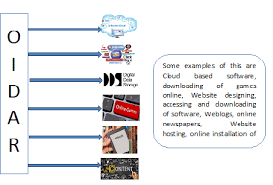In this hi-tech, age business has undergone major transformation and new methods of transactions have evolved which are fast paced and require little physical effort. Out of many one is the concept of OIDAR services which are provided through internet and received by the recipient online without physical interface with the supplier of such services. Following are the various online services provided:-
- Advertising on the internet.
- Providing cloud services.
- Provision of e- books, movie, music, software and other intangibles through telecommunication networks or internet.
- Providing data or information, retrievable or otherwise.
- Online supplies of digital content (movies, televisions shows, music etc.)
- Digital data storage.
- Online gaming.
INCOME TAX PROVISIONS:
In the case of OIDAR services where the service provider (recipient of service charges) is an Indian resident income would be taxable in India. However, the scenario would be different if the service provider (recipient of service charges) is a non-resident. Let us analyze each case:-
a. Advertising on Internet:- If a resident pays for online advertisement to a non resident it is treated as business income and in absence of PE in India it is not taxable in India.

b. Providing cloud services:- There are 3 service models in cloud computing;-
- Software as a service (SaaS)
- Platform as a service (PaaS)
- Infrastructure as a service (IaaS)
Where the recipient (service provider) of cloud services is non-resident it shall be treated as business income and is taxable in India only when NR has permanent establishment in India. It is not covered under Fee for Technical Services (FTS) as there is no human interface.
c. Provision of E-books, movie, music, software and other intangibles through tele communication networks or internet and online supplies of digital content.
As the services are for use of the payer only and no copyright is provided it is regarded as sale, hence business income. If there is no fixed space at the disposal of the service provider, no PE hence not taxable in India.
d. Providing data or information, retrievable or otherwise, to any person in electronic form through a computer network and digital data storage:-
If there is copyright over the data/information/news/articles/photos and rights under Copyrights Act are transferred to the payer, then the payment will be royalty. If information collected from general domain is provided to the payer then it would be business income for the NR payee, payment for use of facilities is not royalty however providing equipment for controlling, monitoring and operating will fall under section 9(1)(vi) and will be regarded royalty.
e. Web Hosting Services:-
It allows to post a website or webpage on the internet. If server is stationed in India, then payment for these services would be taxable in India.
f. Online Gaming:-
Online gaming does not fall in the category of technical services. Online gaming, being a game of chance is akin to lottery on internet, income therefrom will be business income.
GST on OIDAR Services
Where the service provider as well as service recipient are located in India then the place of supply would be location of recipient of service.
However again the scenario would be different if services are provided by non-resident.
For Business to business(B2B) overseas transactions where receiver is located in India, place of supply shall be location of service recipient. Taxability will be under reverse charge mechanism.
For Business to consumer(B2C) overseas transactions where receiver is located in India, the liability to discharge tax is on overseas suppliers. A person supplying OIDAR services from outside India to a non taxable online recipient is required to obtain registration by filing GST REG 10. Registered person providing OIDAR services from a place outside India to a person in India other than a registered person shall file Form GST-5A on or before the 20th of every month.
Equalization Levy:-
Let us analyze the concept of equalization levy which is chargeable @6% on payments made to NRE (not having PE India) with regard to OIDAR services such as online advertisements, hosting websites, SaaS, PaaS and IaaS.
Person receiving service from non-resident must deduct 6% of the amount of consideration as equalization levy and remit the same to Government by 7th of following month. However, there is a threshold limit for applicability of equalization levy of Rs. 100,000/- in a financial year per service provider. Equalization levy is not applicable where the specified service is received by resident for purposes other than business or profession. Further, where a person fails to deduct equalization levy from payment, it is not eligible for deduction as expenditure in view of section 40(a)(ib) unless it is paid before the due date specified in section139(1).
Conclusion:
By the above it can be interpreted that taxation both direct as well as indirect are different in the case of OIDAR services. Are you complying with the law ?
The author is a practicing Chartered Accountant and can also be reached at sandeep@kcccas.com.
DISCLAIMER
The information provided in this article is for general informational purposes only. All efforts have been made to provide accurate information in this document, however it should not be perceived as a professional or legal advice. Reader should consult a professional before making any decision based upon this document. Under no circumstance author or the publisher shall have any liability to you for any loss or damage of any kind incurred as a result of the use of this information.










 CAclubindia
CAclubindia
